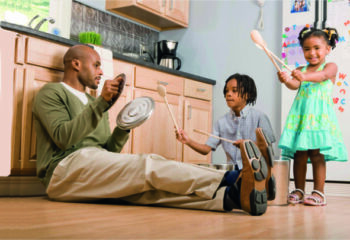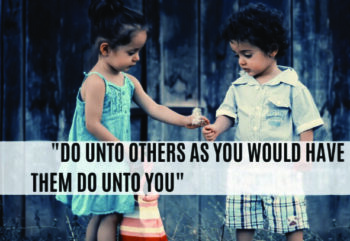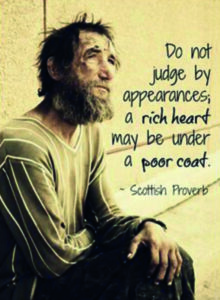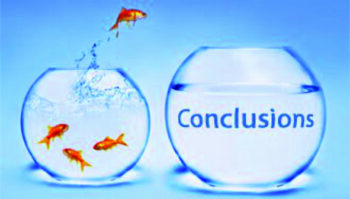How to Judge Others – Fairly
A fourteen-year-old girl entering 9th grade laments that other students have judged and isolated her as being unattractive.
A stay-at-home father of young children experiences judgment from others for being lazy, unmotivated and for living off his wife.
Canadian singer Céline Dione recently responded on social media to judgments and body-shaming directed at her by individuals declaring she is too thin.
 We have so many categories for judging people — by wealth, race, education, religion, gender, appearance, circumstance, language, weight, height, the cars we drive, the homes we own and more. Even though Jesus simply and specifically commanded “do not judge” (Matthew 7:1, NIV), we do it anyway. Since this is a universal human trait, it becomes vital that we shape our judgments so that rather than being harsh and unfair, they are kinder, gentler, balanced and just. Here are some ways to judge others fairly.
We have so many categories for judging people — by wealth, race, education, religion, gender, appearance, circumstance, language, weight, height, the cars we drive, the homes we own and more. Even though Jesus simply and specifically commanded “do not judge” (Matthew 7:1, NIV), we do it anyway. Since this is a universal human trait, it becomes vital that we shape our judgments so that rather than being harsh and unfair, they are kinder, gentler, balanced and just. Here are some ways to judge others fairly.
1. Know and apply biblical teachings
Because the writers of scripture understood the human tendency to judge, evaluate and form opinions about others, they uniformly teach that our judgments upon others be done in keeping with kindness and justice. Here are some samples. Read and reflect on these teachings from the bible, allowing them to shape your personality and your spirituality.
• “Do not pervert justice. Judge your neighbour fairly” (Leviticus 19:15).
• “Speak up and judge fairly; defend the rights of the poor and needy” (Proverbs 31:9).
• “Stop judging by mere appearances, but instead judge correctly” (John 7:24).
• “Who are you to judge your neighbour?” (James 4:12).
• “In everything, do to others what you would have them do to you” (Matthew 7:12).
2. Challenge your assumptions
Often our assumptions are based upon incomplete information and therefore slant themselves toward the negative. Whenever you experience judgment emerging with an unfavourable view of another, challenge it.
An example of this process is offered by psychologist and author Tara Brach:“Imagine you are walking through the woods and you see a small dog. It looks cute and friendly. You approach and move to pet the dog. Suddenly it snarls and tries to bite you. The dog no longer seems cute and you feel fear and possibly anger. Then, as the wind blows, the leaves on the ground are carried away and you see the dog has one of its legs caught in a trap. Now, you feel compassion for the dog. You know it became aggressive because it is in pain and is suffering”. Dr. Brach’s wisdom is a reminder for us to challenge our initial impressions so that we can see the larger picture.
 3. Make your mind a no-judgment zone
3. Make your mind a no-judgment zone
A ‘no-judgment zone’ mindset is one which understands and appreciates the reality that people are doing the best they can, that their way of managing a situation does not need to be the way we choose to do it. A recent social media post by Ashle Potter was positively received by readers because of the way she commended mothers on their widely diverse parenting styles. Her post was to the effect that whether a mother breast feeds or uses formula, she is a good mother. It’s the same for mothers who use cloth nappies or disposable ones; and for stay-at-home mothers and working mothers – they are all good mothers who have made legitimate choices.
4. Don’t rush to reach a negative opinion
In his book A Code of Jewish Ethics, Rabbi Joseph Telushkin relates a decades old incident revolving around a photograph. A newspaper published a picture of new United States Senators taking their oath of office. A few days later, the editorial office received an irate letter from a reader complaining that one of the Senators “didn’t know his right hand from his left”. The letter-writer was correct. The Senator from Hawaii was clearly shown with his left hand raised. However, the writer did not take time to learn that the Senator - Daniel Inouye, a recipient of the Bronze Star and Purple Heart - had enlisted in the army right after Pearl Harbor and lost his right hand fighting for his country. Rabbi Telushkin notes: “A person of wisdom, maturity and compassion is characterised by the ability to delay rushing to reach a negative conclusion about another individual and, instead, seek more information”.
5. Offer the benefit of doubt
When Elizabeth Dorrance Hall walks her dog around the neighbourhood, she waves and greets her neighbours who are in the gardens or driving by, saying, “I want to create a friendly neighbourhood environment, so I do this as much as I can”. Occasionally she gets no response from her neighbours. Rather than making personality attributions about them and thinking negatively about them or concluding they’re unfriendly, she says, “I give them the benefit of the doubt and think about situational reasons they might not wave back at me. Perhaps they are distracted, because they just got a phone call from a friend who is not doing well. Maybe they are stressed at work and therefore distracted at home. Maybe they have earbuds in and literally did not hear me say hello. Making situational attributions instead of personality ones about my neighbours makes me feel better, since I do not think my neighbours are jerks, and makes my future communication with them better for the same reason”.
6. Never judge by appearances
“Beware, so long as you live, of judging men by their outward appearance”, advised 17th century French poet Jean de La Fontaine.
The fact is that what we see seldom reflects reality and when we give free reign to our judgments based on appearance we often miss the truth about an individual.
Louise Jensen tells about a time in her 30s when she was in a car accident which caused her painful spinal damage and aggravated other pre-existing conditions. As a result, she had to use a wheelchair or crutches to facilitate movement. Seeking to lift her spirits, Jensen’s partner presented her with theatre tickets. Though getting in and out of public facilities required meticulous planning, Jensen was excited to attend the showing. Here is what transpired: “We were lucky enough to be able to park in the disabled parking spot right outside the venue. We sat in the car and discussed whether I should take my crutches inside, as I was quite anxious about blocking the aisles. We decided that with his support I would manage the few steps inside without them”.
As she was helped out of the vehicle, a man in a nearby car wound down his window and shouted at Jensen and her partner that they should be ashamed of themselves for parking there”. His outrage was a judgment based on appearance. Jensen didn’t look disabled.
 7. Stop jumping to conclusions
7. Stop jumping to conclusions
This negative habit is so common there is now an acronym for it - JTC - jumping to conclusions. According to Susan Krauss Whitbourne Ph.D., JTC is “a process that leads people to assume, wrongly, that a situation presents them with physical, social, or psychological harm. In other words, you’re confronted with an emotionally ambiguous situation and automatically conclude that the situation will come out badly for you, because other people are out to hurt you”. That attitude can limit and even damage relationships if it is not neutralised in some way.
Consider the experience of writer Julia Attaway who recalls a time when she was “annoyed” that a friend in whom she had confided a difficult problem hadn’t been in touch with her for some time.
“Maybe she doesn’t want to be close to someone with a problem”, was her immediate thought. A short time later, the friend texted Attaway seeking to arrange a play date for their children”. “I texted back, and as a habitual afterthought added, “How are you doing?’ “The friend replied, saying her family life was in turmoil because her husband moved out three weeks earlier and they were still adjusting to the change. Attaway writes: “I was glad this news came via text rather than in person, so she couldn’t see the look of shame on my face. Her silence wasn’t about me and my problems at all. Her silence was a reflection of her own problems, which only goes to show that there’s almost always an explanation other than the uncharitable one that first comes to mind”.
 By being more aware and intentional about our opinions and judgments of others we can move toward a direction which creates greater harmony and hospitality while reducing dislike and disapproval.
By being more aware and intentional about our opinions and judgments of others we can move toward a direction which creates greater harmony and hospitality while reducing dislike and disapproval.


 Entries(RSS)
Entries(RSS)